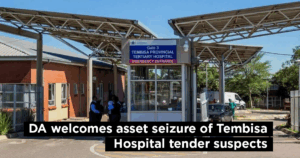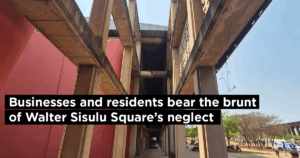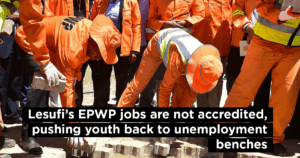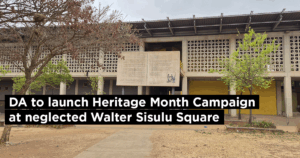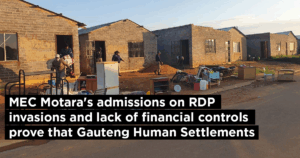Over 1.3 million residents in Gauteng are on the housing waiting list, with some waiting since 1996. However, residents may have to wait another 158 years to receive a house, given the current rate of just over 9 000 houses built annually. This is based on the fact that the Department only delivered 43 050 (3,3%) houses in five years.
This information was revealed by the Gauteng MEC for Human Settlements and Cooperative Governance and Traditional Affairs (COGTA), Tasneem Motara, in a written reply to the Democratic Alliance’s (DA’s) written questions tabled in the Gauteng Provincial Legislature (GPL).
See reply here.
According to MEC Motara, there are 1,362,641 potential beneficiaries registered on the housing waiting list. Some of these beneficiaries have been on the list since 1996. They are from the following Gauteng regions: the City of Johannesburg, the City of Tshwane Metropolitan, Ekurhuleni Metropolitan, Sedibeng District Municipality, and West Rand.
MEC Motara states that the department delivered 43 050 houses from 2019/2020 to 2023/2024. This is an average of 8 610 houses per year. Of the 43 050 houses built, a total of 23 523 housing units were allocated to qualifying beneficiaries from 2019 to date. In other words, only 54% of the houses have been allocated.
The low percentage of houses built and allocated in the past five years highlights the current government’s unmistakable incompetence in alleviating the suffering of poor residents in this province. At the heart of this issue is their failure to effectively plan and manage the funds to provide relief to Gauteng residents, who have been waiting in vain for 28 years.
The long wait for housing must come to an end. This department should not taunt Gauteng residents by registering them as beneficiaries, igniting their hope, and failing to deliver on its commitments.
According to Section 26 of the Constitution, which enshrines the right to adequate housing, we urge the MEC to expedite shelter delivery and ensure implementation targets are met to provide decent housing for our communities.
A DA government would accelerate the efforts to tackle the current housing backlog by enabling the private sector to play a greater role in developing innovative housing delivery models and affordable integrated housing projects. The DA would also eliminate the legal, administrative, operational, and financial barriers that currently hinder access to housing, including the failure to provide title deeds for state-subsidised housing.
The DA will continue to put pressure on MEC Motara to adopt its approach to ensure that the department delivers dignified housing and reduces the backlog.
